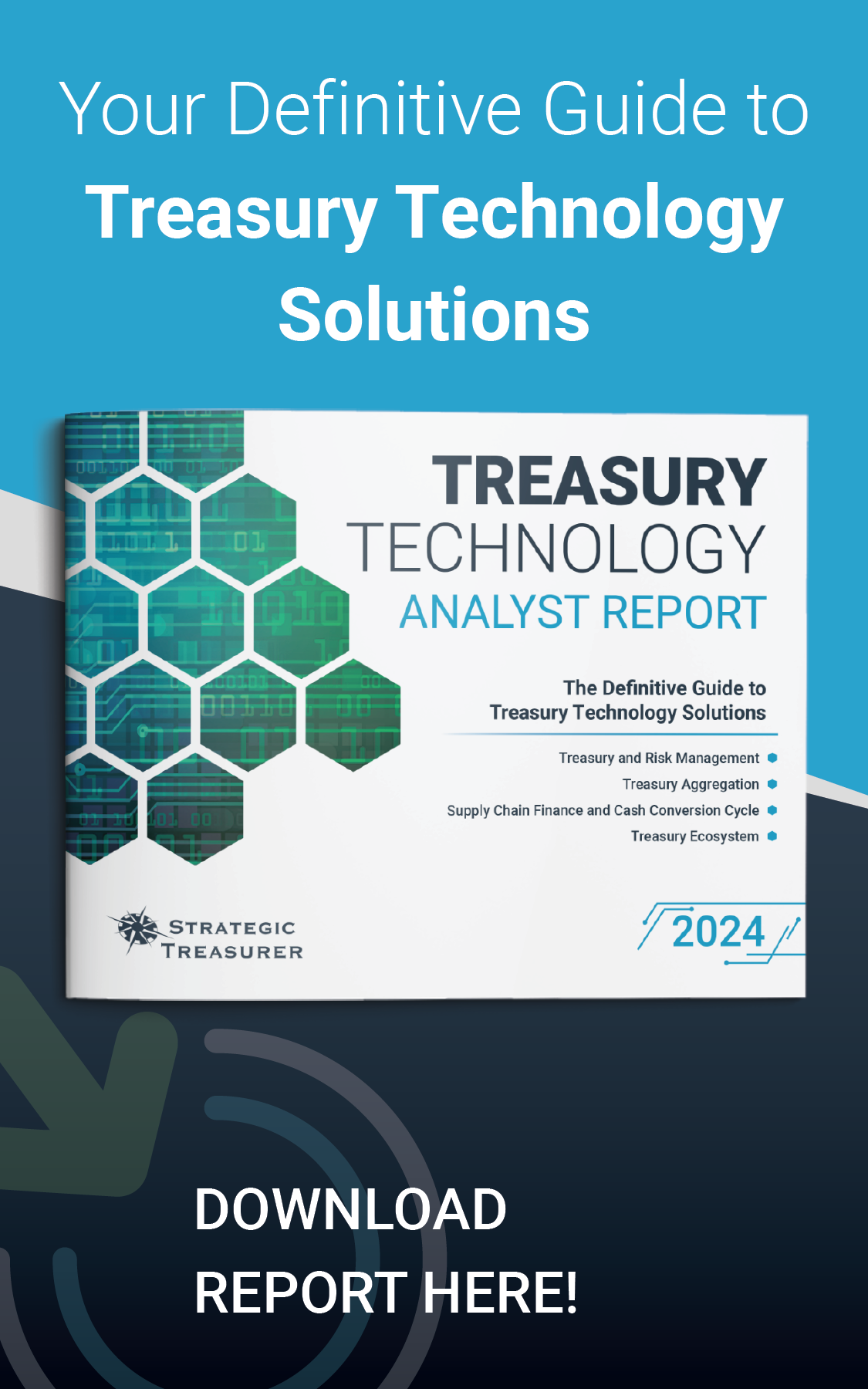
Episode 01
Coffee Break Sessions: What is Cash?
We’re excited to announce our new series on The Treasury Update Podcast! The Coffee Break Sessions series consists of 6-12 minute episodes covering foundational treasury topics and questions in about the same amount of time it takes you to drink your coffee. Tune in every first and third Thursday with Special Host and Treasury Consultant Alexa Cook of Strategic Treasurer.
On this first episode, Host Alexa Cook kicks off the new series interviewing Craig Jeffery on how businesses define and view cash and why “cash is king.” Tune in to their discussion
Host:
Alexa Cook, Strategic Treasurer


Speaker:
Craig Jeffery, Strategic Treasurer


Episode Transcription - Episode 1: Coffee Break Sessions: What is Cash?
Alexa Cook:
Hey, guys. Welcome to the Treasury Update Podcast Coffee Break Sessions, the show where we cover foundational treasury topics and questions in about the same amount of time it takes you to drink your coffee.
Craig Jeffery:
Welcome to the Treasury Update Podcasts Coffee Break Sessions. Want to introduce you to Alexa Cook, who is a consultant with Strategic Treasurer, who is also one of the podcast hosts for these special Coffee Break Sessions.
Alexa Cook:
Thanks, Craig. So today, we will be introducing the Coffee Break Sessions, which are designed to cover foundational topics and definitions and have a variety of hosts. So today, I’ll be hosting, and I’m joined by Craig, who just introduced me, who is our managing partner and founder of Strategic Treasurer. To start off the Coffee Break Sessions, today’s podcast will take a look at cash. So Craig, what is cash?
Craig Jeffery:
Well, cash, you can have two different definitions, and I think most people know what cash is when you have it in your pocket. From an organizational standpoint, there’s two primary definitions. One is an accounting definition and one is a treasury definition. So I’ll start with accounting. Accounting usually follows different accounting principles, like generally accepted accounting principles. So cash is treated as what’s in the bank or near cash. For example, if you cut a check, even though that check might be mailed, and might not clear against your account for five or seven or 10 days, accounting would still reduce their balance on their general ledger, say, “We don’t have that cash, because it was issued.” By the same token, if they received notification that a payment had come in, they would apply it, relieve a receivable, and hit cash from an accounting standpoint, even if the funds were not available or hadn’t cleared at that time. So their definition is, “It’s close enough to cash, we’ll treat it that way.” And that makes sense from an accounting perspective.
Craig Jeffery:
Treasury looks at available cash. What cash do you have that you can spend? That old story about, “I can’t be broke. I still have checks,” plays to some extent to that idea that it has to be available funds that can be used. So cash has slightly different definitions. There’s a bit of a timing difference between the accounting and the treasury definition there.
Alexa Cook:
Okay, so why are companies so focused on cash, and why is it so important to the measurement of a company’s wellbeing?
Craig Jeffery:
That is a good question. So cash is the most liquid form of liquidity. Maybe you’re not allowed to say those two words together, but it’s immediately available. Like a receivable is, you want to convert a receivable to cash, so that you could then pay your bills. And when you look at some of the near cash items like cash, accounts receivable, short-term investments, those things that you can turn into liquid funds, that’s a great measure of what liquidity do you have, does your organization have the ability to meet their obligations as they come due, and nothing’s as valuable as cash. You can’t pay a bill with the receivable. You might be able to convert that receivable to cash by securitizing that, or providing that off as a basis of a loan, but cash is king. You also … You oftentimes hear cash is king, queen, jack, or whatever royalty you have in your deck of cards. It’s very important, even more important than receivables.
Alexa Cook:
So to circle back to the first question, you talked about the differences between the accounting and treasury uses and applications of cash. Do you maybe want to elaborate a little more on the differences?
Craig Jeffery:
Yeah, sure. Different parts of an organization have different drivers and motivations. So for example, someone in the collections area, the credit manager will have people doing collection and cash app. What do they care about at the end of the month? They care about reducing their receivables. And so let’s say they receive checks. Checks are horrible, I know, not everybody has a lot of checks, but let’s just use this as an example. So if they get payments coming in, they may divert them from a lockbox, and they’ll use those checks, or an image of those checks, to relieve receivables. They’ll punch it into their accounting system. And they don’t have nearly the care that they do to get those deposited in the bank account, so that when they relieve the receivable, they debit cash, credit the receivable, reduce their receivable increase in cash.
Craig Jeffery:
Now, they don’t have any cash in their bank account where it’s useful. They have cash in their accounting system. And then, two days later, three days later, they take and deposit those checks, and then the checks clear a day or two later. They’ve lost all of that float, but they don’t have a problem from their perspective, because they’ve adjusted the receivables. They’ve got cash on the accounting records, but you don’t have funds that can be used for the organization. That’s an example of how those different views can work. There’s a couple situations where that matters, not just with check float, but with other kinds of float, and how you record activity.
Alexa Cook:
Okay. That makes sense. So from a cash perspective, what is Wall Street looking at? The treasury or the accounting piece?
Craig Jeffery:
Well, I think there’s a couple elements to that. Primarily, in Wall Street, anybody who’s doing financial analysis is looking at the financial statements. Financial statements would track gap cash. They have to report that way. They wouldn’t care about outstanding check liability, checks that are clearing. That would usually be considered noise. So that’s not really what they’re … They’re looking at the accounting treatment. But what is important, especially when an organization is more near the edge, or they’re just trying to be very efficient with their cash, they cannot be good stewards and not drive to the treasury definition of cash, drive to using that. And you can certainly use the treasury definition of cash, have visibility to it in the financial statements, and still comply with gap reporting. And you just see, “Here’s my outstanding checks that have been cut that haven’t been cleared.” Same thing with, perhaps, deposits that haven’t hit the bank yet.
Alexa Cook:
Okay. So I’m hearing that Wall Street’s looking at both in a way. So some of those key takeaways are, there’s two definitions for cash. The first is the accounting, which is what’s in the bank, or what’s the near cash amounts. And then the treasury, so that’s what’s available and what we can actually spend. And again, Wall Street’s focusing on a mixture of the two of those. Is there anything else you’d like to add, or does that pretty much sum it up?
Craig Jeffery:
No, that’s pretty good. I think I made the definition so that both the accountant and the treasurer would be, not as pleased with that definition, but I think people will understand the difference there. I did want to say I’m pretty excited about this Coffee Break Session component of the Treasury Update Podcast. I think it’s really important to cover some other topics, shorter in duration, and focusing on other areas. So thanks for hosting the first Treasury Update Podcast Coffee Break Session, Alexa.
Alexa Cook:
Yeah. Thank you again for your time.
OUTRO:
This podcast is provided for informational purposes only, and statements made by Strategic Treasurer LLC on this podcast are not intended as legal, business, consulting, or tax advice. For more information, visit and bookmark strategictreasurer.com.


